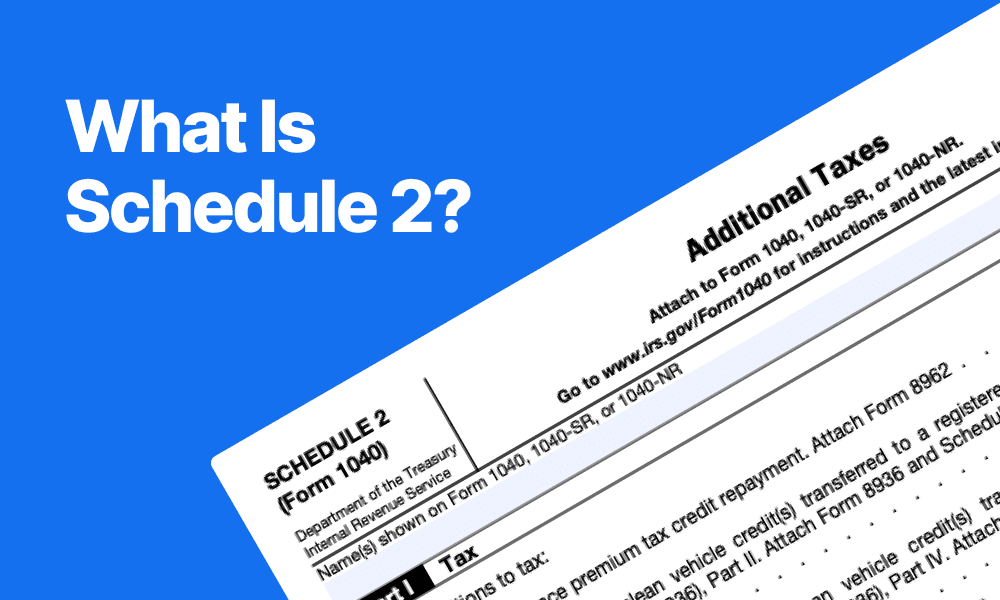What Is Schedule 2 (Form 1040)? | Additional Taxes Explained | TAXtical

Schedule 2 (Form 1040): What It Is, Who Needs It, and Why It Matters
When preparing your federal tax return, the IRS Form 1040 might require additional forms called “Schedules” to report certain types of income, deductions, or taxes. One of these is Schedule 2 (Form 1040), which reports additional taxes that aren’t included directly on the main Form 1040.
In this blog post, TAXtical explains everything you need to know about Schedule 2, including:
What Schedule 2 is
Who must file it
What taxes it reports
How to complete it
How TAXtical can help you stay compliant
What Is Schedule 2 (Form 1040)?
Schedule 2 is a supplemental form used with IRS Form 1040 to report additional taxes owed. While Form 1040 covers most income and taxes, Schedule 2 captures other types of tax obligations that don’t appear on the main form.
This form is typically required if you owe:
Alternative Minimum Tax (AMT)
Excess advance premium tax credits
Self-employment tax
Uncollected Social Security or Medicare tax
Additional taxes on IRAs and other retirement plans
Who Needs to File Schedule 2?
You may need to file Schedule 2 if:
✅ You owe self-employment tax
✅ You received premium tax credits for health insurance and need to repay some of them
✅ You have additional tax on early retirement withdrawals
✅ You owe the Alternative Minimum Tax (AMT)
✅ You must report household employment taxes
Common taxpayers who need Schedule 2 include:
Freelancers and independent contractors
Taxpayers with early withdrawals from retirement plans
High-income earners subject to AMT
Individuals with advance payments of health insurance credits
What’s Included on Schedule 2?
Schedule 2 is divided into two parts:
Part I – Additional Taxes
Alternative Minimum Tax (AMT)
Excess advance premium tax credit repayment
Part II – Other Taxes
Self-employment tax
Household employment taxes
Additional tax on IRAs, other qualified retirement plans
Net Investment Income Tax (NIIT)
Section 965 net tax liability
Uncollected Social Security and Medicare tax
Why Is Schedule 2 Important?
✅ Ensures complete tax reporting – Schedule 2 helps taxpayers properly report and pay all applicable taxes.
✅ Avoids IRS penalties – Not filing required taxes can result in interest and fines.
✅ Keeps your return accurate – Ensures your total tax liability is correctly reflected on Form 1040, Line 23.
How to File Schedule 2
You’ll attach Schedule 2 to your Form 1040, and the totals from Schedule 2 will flow into Line 23 of your 1040. Depending on your situation, tax software will usually generate this form automatically if needed.
How TAXtical Can Help
Understanding which IRS schedules you need can be confusing, especially when additional taxes are involved. At TAXtical, we ensure every part of your tax return is accurate and compliant.
✅ Self-employment and small business tax filing
✅ Premium tax credit calculations and reconciliations
✅ Retirement plan tax guidance
✅ Audit protection and tax resolution
✅ Year-round tax strategy support
Don’t Miss a Schedule – Let TAXtical Handle It
If you're unsure whether you need to file Schedule 2 with your Form 1040, TAXtical is here to guide you. We’ll help you avoid IRS surprises, reduce your risk of penalties, and optimize your tax filing.
📞 Contact TAXtical today for a consultation and stress-free tax filing!

